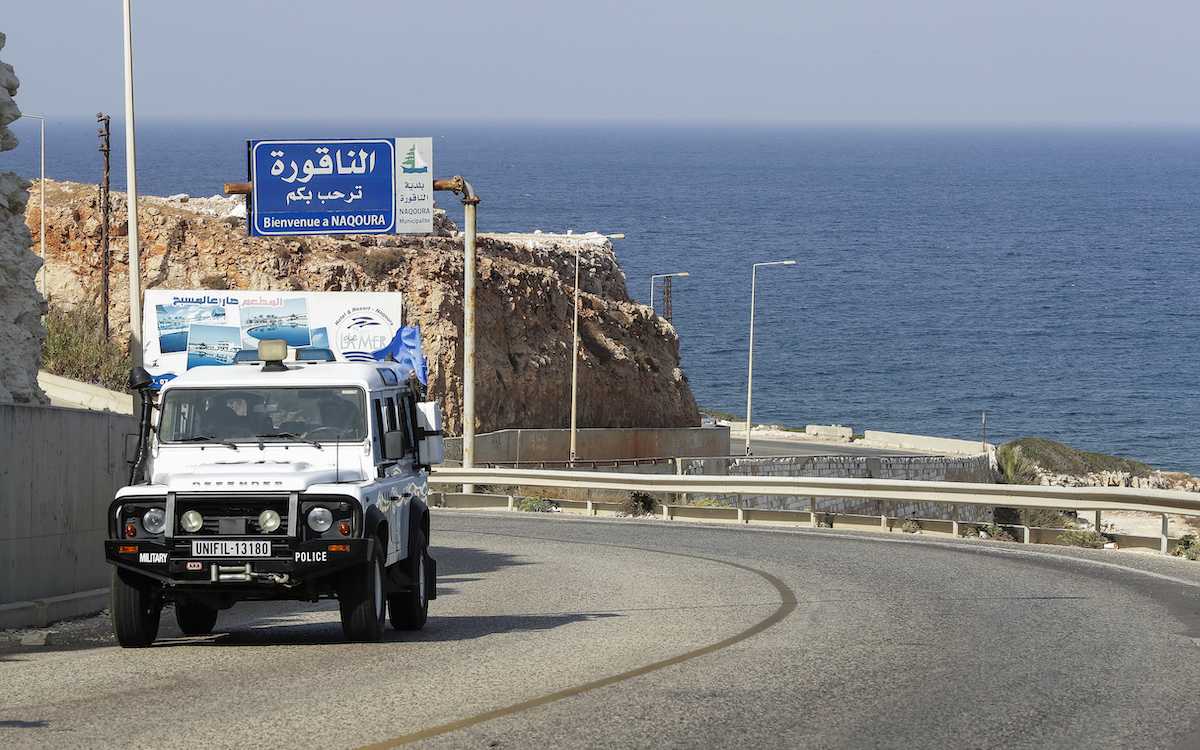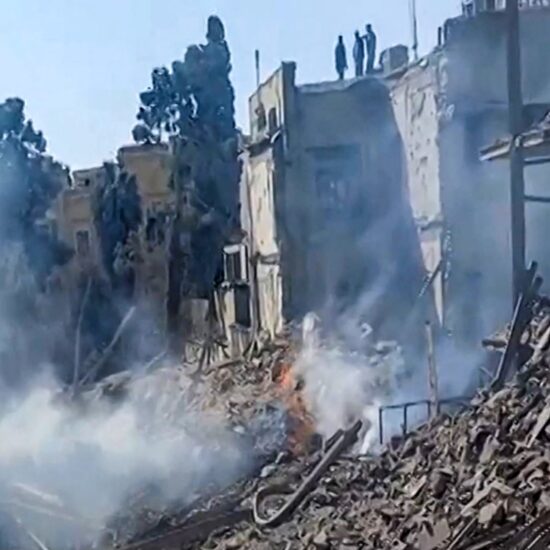
The United States finally delivered its proposal for a deal between Lebanon and Israel over their maritime borders over the weekend.
And, surprisingly, it has not been flat-out rejected by politicians on either side of the negotiating table. None even raised any major concerns about it.
In Lebanon, Parliamentary Speaker Nabih Berri said that the proposal “in principle meets the Lebanese demands.”
Caretaker Israeli Prime Minister said that this deal “strengthens Israel’s security and Israel’s economy.”
Even Hezbollah’s secretary-general, Hassan Nasrallah, seemed supportive of the agreement, saying in a speech over the weekend that he would support the Lebanese government’s decision when it comes to the deal. Almost everyone in Lebanon knows that if Hezbollah does not approve of the deal, then it will never be signed.
The only politician who seemed to take issue with the deal was the Israeli opposition leader Benjamin Netanyahu, who lambasted the deal as Israel conceding to Hezbollah and arguing that Lapid has no authority to make any such deal in his caretaker status.
“Lapid has no mandate to give sovereign territory and sovereign assets that belong to all of us to an enemy state,” Netanyahu stated.
In fact, Netanyahu has said that he will not honor the agreement if he does well in the upcoming elections in Israel and is able to return as prime minister.
This would almost guarantee that the risk of conflict will skyrocket to levels not seen in years.
Lebanese President Aoun, Prime Minister-designate Najib Mikati and Berri are set to meet at the Presidential Palace in Baabda today to discuss the deal, and it seems like things are headed in a positive direction.
Lebanon is desperately hoping that they will be able to drill in the Qana field and reap the benefits of the possible natural gas under its surface. However, if they are hoping that it will pull Lebanon out of the ongoing economic crisis any time soon, they are sadly mistaken.
Most experts say it will take years for Lebanon to see any of the rewards from the gas.
If the politicians think that this deal will help get them out of passing any of the reforms required to unlock funding from the IMF and international community, they have another thing coming.
No matter what, these reforms are needed and being able to drill for natural gas does not suddenly change Lebanon’s situation. Rather, it only adds to the need for changes.
In Lebanon
Failure to elect: Lebanon’s Parliament failed to come to a consensus and vote for a new president to replace Aoun after his term comes to an end on October 31.
Few were surprised by this outcome, with many expecting the election process to be long and dragged out. If anything, it would have been more surprising if Lebanon’s ever-bickering politicians were actually able to come together and choose someone in the first round of voting.
The majority of parliamentarians cast blank ballots while MP Michel Maouwad received 36 votes. 11 of the opposition candidates voted for businessman Salim Edde. Mahsa Amini, the 22-year-old Iranian woman who died after being taken into custody by Iran’s morality police, received one vote.
The next round of voting has yet to be scheduled, as Berri announced that he would not hold another session until an agreement was reached.
The value of money: After around 30 years, Lebanon’s government has announced that it will finally raise the fixed exchange rate of the country’s ailing currency nearly three years into an ongoing economic crisis.
The Finance Ministry said that it would be gradually raising the fixed exchange rate, which currently sits at 1,507 lira to US$1, to 15,000 lira to US$1 starting in November.
While this is still a long way away from meeting the current market rate, which has been fluctuating between 38,000 and 39,000, it is a step toward unifying the country’s many exchange rates.
However, if done alone and without any other reforms, it will only serve to push the market rate and inflation higher, worsening the country’s already dire situation.
Caretaker Economy Minister Amin Salam has said that reforms will hopefully be enacted in October if there is the “political will.”
Women, Life, Freedom: Demonstrators gathered in Martyrs Square in Beirut in a show of solidarity with the protesters in Iran who have been in the streets for two weeks following the death of Mahsa Amini, also known by her Kurdish name Zhina, after she was detained by Iran’s morality police for supposedly not wearing her hijab properly.
The women called to attention the violence against women that has been perpetrated throughout the region and how laws in many of these countries almost encourage it since they dictate how women should live their lives.
Some of the protesters also pointed out that these protests had little to do with the hijab but, rather, had more to do with women’s rights and women having the ability to choose how to live their lives instead of having it dictated to them.
While women in Lebanon enjoy more freedom than their counterparts in countries like Iran and Saudi Arabia, they still face many restrictions. Women cannot pass on their Lebanese citizenship to their children, and the various religious courts in Lebanon often rule in favor of men.
Forced out: Syria’s ambassador to Lebanon reiterated his country’s interest in having the refugees that have been living in Lebanon for the last decade repatriated back to Syria, despite concerns raised by human rights organizations over their safety.
Ambassador Ali Abdel Karim Ali said Friday that his country was “serious about receiving them and facilitating their return” and that the Syrian government would not “hesitate to secure everything that achieves their dignified return.”
Lebanon has previously stated that it is planning on returning 15,000 Syrian refugees per month in the near future. But, since this plan was announced, there has been little heard about the follow-through.
Human rights organizations have repeatedly noted that Syria is not safe for refugees to return to, as there is a high likelihood that many of them would be disappeared by Syria’s notorious security services for any range of reasons from trying to avoid their mandatory military service to allegedly supporting the popular uprising against the country’s brutal ruler, Bashar al-Assad.
Syria insists that no one who returns would be harmed but, after a boat carrying 150 migrants set for Italy sank off the coast of Tartus, Syrian authorities arrested some of the survivors, claiming either that they were wanted individuals or that they needed to complete their military service.
Palestinians were also detained by Syrian authorities, along with Fouad Hablas, a Lebanese survivor of the boat sinking, who was transferred to a military hospital. According to Syrian law, anyone who enters the country through illegal means can be subject to detention.
Shots fired: Former MP Othman Alam al-Din was temporarily detained by Lebanese security forces over the weekend after a video of him shooting a gun in the air at his home in Minyeh emerged.
Alam al-Din was soon released and it is unclear if any further action will be taken against the former politician.
Ironically, after he was released, Alam al-Din was welcomed back to Minyeh with a hail of gunfire.
View this post on Instagram
In the region
Iran protests continue: After over two weeks since Mahsa Amini’s death, protests across Iran continue in full force.
More recently, government forces, namely the Basij, have assaulted Sharif University in Tehran, one of Iran’s top universities.
Student protesters are said to be surrounded as security forces violently crack down on the demonstrators.
Students flee for their lives at Sharif University in Tehran!
Please do not give up on the people of Iran…they need you more than ever!
Please keep tweeting, posting, and retweeting! #MahsaAmini #ZhinaAmini pic.twitter.com/GCgtw0zvOT
— Yashar Ali 🐘 یاشار (@yashar) October 2, 2022
It is estimated that over 130 people have died across Iran since the outbreak of protests.
A much-needed calm: The truce between the Iran-backed Houthi rebels and the Saudi-backed Yemeni government expired on Sunday, October 2.
Originally signed in April, the truce has been renewed twice already, in the longest lull in fighting since the conflict began.
The truce came as fighting in Yemen reached a fever pitch after the Houthis launched an offensive against the strategic city of Marib in early 2021. By September 2021, they cut the main supply line to Marib from Ataq, eventually reaching the southern outskirts of the city by the end of the year.
The Houthis’ gains forced the UAE, which had drawn down its involvement in Yemen in 2019, to move its proxy forces from al-Hudaydah to the Marib front, eventually prompting the Houthis to target Abu Dhabi with drones earlier this year.
The air campaign against the Houthi-held capital of Sanaa also escalated, leaving scores of casualties and causing untold suffering among the civilian population.
The truce has ended large-scale fighting, though local skirmishes and clashes still do occur.
As both sides look for a more conclusive agreement to end the war, the besieged city of Taiz has been a main point of contention.
Though it is under government control, the Houthis captured all major roads into the city in 2015, restricting access to Taiz’s beleaguered population.
There is much fear and anxiety that, if the truce is not renewed, intense fighting will again break out.
When the Russians came: Seven years ago, the Russian air force began its campaign in Syria.
Since then, the rebels have not won a major battle or launched a successful offensive outside of the Southern Aleppo campaign in 2016 that ultimately managed to break the siege of the rebel-held eastern half of Aleppo city, if only briefly, and their defense of Kabani in the Latakia countryside.
Though it was Iran and its allied militias that prevented the Syrian government’s demise, it was Russia that allowed it to “win.”
Russia said it was intervening in Syria to fight the Islamic State (IS), which had captured the ancient city of Palmyra months earlier and reached the outskirts of Damascus and Homs, but its air campaign instead focused on western Syria, where more moderate forces were present.
Only in 2017, after fully capturing Aleppo, did the Syrian government and Russia make a concerted effort to clear IS from the Badia desert.
The pro-opposition Syrian Observatory for Human Rights has put the total death toll from the Russian air strikes in Syria at more than 21,000, including 8,697 civilians, a quarter of whom were children.
Back in Baghdad: After weeks of calm, protests again broke out in Baghdad last week, as supporters of Shiite cleric Muqtada al-Sadr attempted to storm parliament in protest of the resignation of the speaker.
Rockets were also fired into the Green Zone.
Today, October 3, it was reported that clashes broke out in Basra this morning.
Earlier today at dawn, clashes broke out in Karmat Ali district in Basrah southern Iraq.
Unconfirmed reports say it was between Saraya Al-Salam and AAH. #Iraq pic.twitter.com/8KNxxijlp2— Tammuz Intel (@Tammuz_Intel) October 3, 2022
The weekend also marked the third anniversary of Iraq’s protest movement which began in October 2019, the same month as Lebanon’s mass protest movement.
On top of all this, Iran shelled positions of the Democratic Party of Iranian Kurdistan (KDPI) in northern Iraq in retaliation for the group’s support for the current protests in Iran.
Iraq continues to be a hotbed of regional tension.
Death by fear: Rayan Suleiman, a seven-year-old Palestinian boy, died last week after being chased by Israeli forces in the West Bank.
Occupation forces pounded on the door of Suleiman’s house, and shortly after the boy was dead.
Rayan’s father said that Rayan had collapsed after he saw the Israeli soldiers who chased him appear at his front door.
The soldiers had accused the boy of throwing rocks.
The most likely cause of death as of now is cardiac arrest brought on by increased adrenaline; In essence, Rayan died from fear.
The boy’s death is another painful reminder of the horrors of the Israeli occupation.
What we’re reading
Insecurity: Throughout Lebanon, there has been a rise in violent crime as the situation in Lebanon worsens and people become increasingly desperate. I wrote for NOW on this rise in violence and what it says about where the country is headed.
Challenging authority: This has not been a good year for Iran. Its grip on power in Iraq is not what it used to be as supporters of Muqtada al-Sadr have brought politics to a standstill and call for an end to Iranian influence in the country. In Lebanon, Hezbollah’s popularity has increasingly fallen even as the group becomes more powerful. And, at home, nationwide protests have erupted after the death of Mahsa Amini, or Zhina. NOW’s David Isaly wrote about the challenges that Iran now faces, with the first being the protests in its own country.
How to revolt: The recent protests in Iran have given some hope that there might actually be some serious changes in the country, even the possibility of toppling the regime that has been in power since the Islamic Revolution in 1979. However, the New York Times’s Max Fisher has found that as time has gone on, protests have increasingly failed globally.
Lebanon+
Podcasts: In his most recent episode of the Beirut Banyan, Ronnie Chatah sat down with Tala Khlat and Delphine Darmency to discuss collective memory and reclaiming history in Lebanon, the importance of places like Beit Beirut to address national wounds as well as an exhibition currently underway at Beit Beirut.
What is happening in Iran? A lot of it has to do with women’s rights and women’s ability to choose how to live their lives. But there is a lot more going on underneath the surface that has to do with things like the discrimination against Iran’s Kurdish population. On the latest episode of Popular Front, host Jake Hanrahan spoke with the writer and director Beri Shalmashi about the protests and aspects of them that many may not know about.
A special thanks to my colleague David Isaly for helping out with the briefing this week.
Until next week, follow NOW Lebanon on Twitter, Instagram, Facebook, and LinkedIn, and subscribe to our weekly newsletter. And stay safe.









